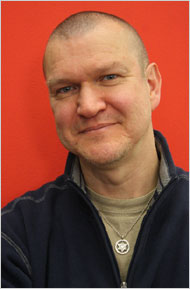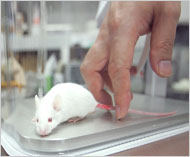Music lifts our spirits during the best of times, so it’s no surprise that many people turn to music in times of poor health. For Dana Jennings, a Times editor who writes every week about coping with prostate cancer, music is an important part of his treatment.
“While the hormone shots and the radiation sessions are essential, they don’t tell the whole treatment tale,” he writes in his latest piece, “Notes to Soothe the Savage Cells.” “I’m a music-obsessive, and I can’t imagine having prostate cancer without listening to just the right music to complement my moods: joy and sadness, anger and gratitude, fear and doubt.”
Prostate Cancer Journal
One Man’s Story
Dana Jennings blogs about his experience with prostate cancer.
For Dana, listening to heavy metal music helps him manage the anger of cancer. This week, he offers his own personal playlist of “music to have cancer by.” Among his favorites, “Hallelujah” by Jeff Buckley, “Moanin’ at Midnight” by Howlin’ Wolf and “Hurt” by Johnny Cash.
Whether music has played an important role in your own cancer or other treatment, or if music is essential to your workout, we want to hear from you. Help us create a soundtrack for health, by sharing the most important song from your own personal health playlist. Tell us how the song helps you, and why it should be included on a soundtrack for health.
If we pick your submission, you’ll receive a signed copy of Dana’s latest book, “Sing Me Back Home: Love, Death and Country Music.”
Share your songs and your stories below. We’ll pick our favorites and post the entire playlist with song links.













 Healthy living doesn't happen at the doctor's office. The road to better health is paved with the small decisions we make every day. It's about the choices we make when we buy groceries, drive our cars and hang out with our kids. Join columnist Tara Parker-Pope as she sifts through medical research and expert opinions for practical advice to help readers take control of their health and live well every day. You can reach Ms. Parker-Pope at
Healthy living doesn't happen at the doctor's office. The road to better health is paved with the small decisions we make every day. It's about the choices we make when we buy groceries, drive our cars and hang out with our kids. Join columnist Tara Parker-Pope as she sifts through medical research and expert opinions for practical advice to help readers take control of their health and live well every day. You can reach Ms. Parker-Pope at 

